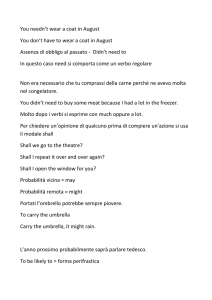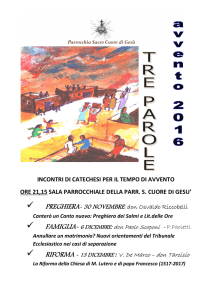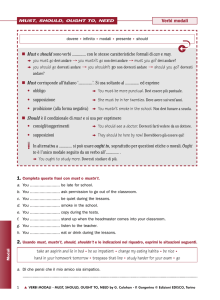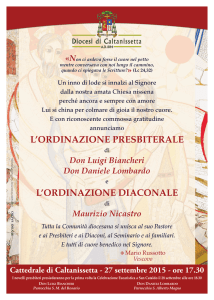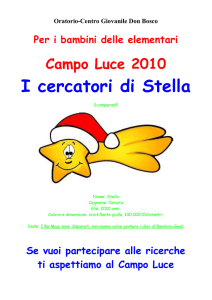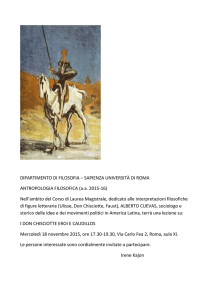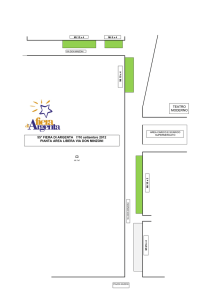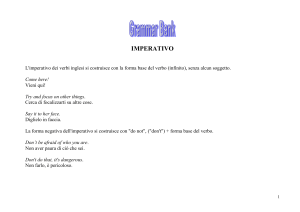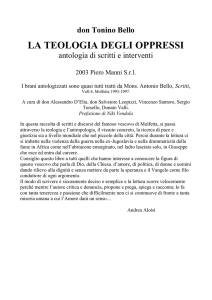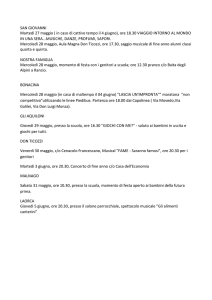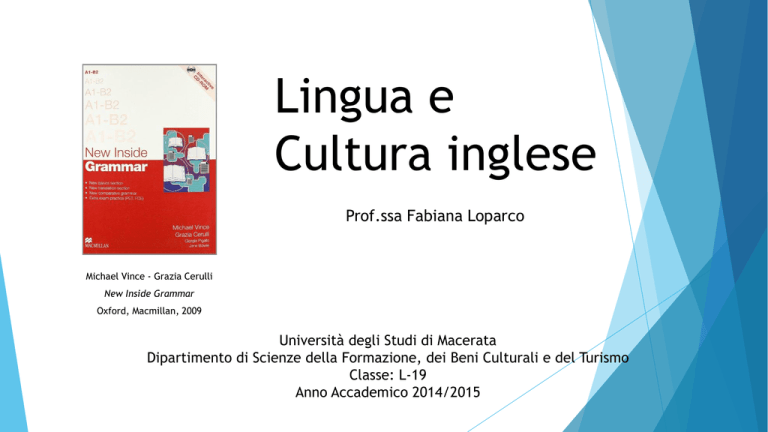
Lingua e
Cultura inglese
Prof.ssa Fabiana Loparco
Michael Vince - Grazia Cerulli
New Inside Grammar
Oxford, Macmillan, 2009
Università degli Studi di Macerata
Dipartimento di Scienze della Formazione, dei Beni Culturali e del Turismo
Classe: L-19
Anno Accademico 2014/2015
Lesson number: 14
1. Must, have to, should
2. Didn’t need to vs needn’t to
3. Be to, be expected to, be supposed to
4. Make/Let s.one do e Get s.one to do
1. Must, have to, should
Must esprime un obbligo più forte rispetto a have to ed è perciò usato in genere quando è colui che parla
che impone un ordine, un obbligo o esprime una forte raccomandazione
All students must wear a uniform
You must come and visit us some time
Have to è usato per esprimere un ordine o un obbligo che non dipende dalla volontà di chi parla, o una
necessità. Ricordate che have to richiede l’uso di do/does nelle forme interrogative e negative
Do you have to wear a uniform at school?
Jean quite often has to work overtime
Nella prima persona la scelta tra must e have to dipende da come è sentito il dovere: si usa must quando
è sentito come interno a sé, ad esempio un imperativo morale; have to quando lo si sente come
determinato da circostanze esterne
I must go and visit my grandmother today (mi sentirei in colpa se non lo facessi)
I have to go and visit my grandmother today (è un impegno che ho oggi)
Nelle domande must è usato quasi esclusivamente nelle prime persone, e ha valore più enfatico (= devo
proprio?) rispetto a have to
Must I/we attend the meeting?
Do I/we have to…?
Nella forma negativa mustn’t esprime un ordine di non fare, una proibizione.
Remember, you mustn’t touch this wire
Per esprimere una mancanza di obbligo si usano don’t have to, needn’t, don’t need to
You don’t have to/don’t need to/needn’t cut the grass (non è necessario che tu lo faccia)
In inglese britannico è possibile usare le forme have got to/haven’t got to/have you got to? in riferimento
a obblighi/necessità contingenti
I’ve got to do some cleaning this afternoon (o I have to do…)
What have you got to do today? (o What do you have to do…)
Exercises
Completa le frasi con must o con have to. In alcuni casi i verbi sono alla forma negativa, del
passato o del futuro
•
You _____________ finish the essay today. It’s for next week
•
The doctor says I _____________ lose weight
•
You ____________ stop smoking if you want to get better
•
The judge said that you ___________ stay away from her
•
One day we _____________ function without petrol
•
We ____________ wear uniforms in school, we could wear whatever we wanted
•
At least you ________________ change trains
•
You __________ enter when mass is in progress
•
You ____________ leave at once!
Exercises
Completa le frasi con must o con have to. In alcuni casi i verbi sono alla forma negativa, del
passato o del futuro
•
You don’t have to finish the essay today. It’s for next week
•
The doctor says I have to lose weight
•
You must/have to stop smoking if you want to get better
•
The judge said that you have to stay away from her
•
One day we will have to function without petrol
•
We didn’t have to wear uniforms in school, we could wear whatever we wanted
•
At least you don’t have to change trains
•
You mustn’t enter when mass is in progress
•
You must/have to leave at once!
Should e ought to corrispondono alla forma condizionale di must, e sono perciò un modo più diplomatico di
esprimere un ordine, un obbligo o una raccomandazione. Sono spesso usati nel dare consigli.
You should/ought to be more careful
Do you think I should/ought to invite them?
Ought to è anche usato per ricordare a qualcuno il proprio dovere: You ought to leave your room in order
Should può inoltre essere usato per esprimere ipotesi
They shouldn’t be too long
Had better o had better not è più informale di should e ought to. Si usa come avvertimento riguardo a
casi particolari e non a situazioni generali
You had better clean the kitchen before the landlord come back
Nota: nonostante la forma verbale al passato, had better si riferisce al presente o al futuro
You had better slow down (= Faresti meglio a rallentare)
Gli altri tempi del verbo dovere di formano con have to
We had to/didn’t have to…
They’ve never had to…
Will you have to…?
I may have to…
I hate having to…
Notate che la forma negativa didn’t have to esprime mancanza di necessità. Un divieto viene
espresso al passato con couldn’t o wasn’t/weren’t allowed to
I had a very strict upbringing. There were a lot of things I couldn’t/wasn’t allowed to do
Nota: be allowed to richiedere sempre una costruzione personale. It impersonale come soggetto
anticipatorio non è mai possibile:
We couldn’t swim/weren’t allowed to swim in that lake. Swimming was not allowed there
non It was not allowed to swim there
Exercises
Scegli l’opzione corretta
•
She worries too much, she should/had better relax more
•
You ought/should take your work more seriously
•
My train is in an hour. I’d better/ought go now
•
I feel so embarrassed – what should/ought I do?
•
What a nasty cough! You ought/should to see a doctor
•
We have/had better check the train timetable before we leave
•
You oughtn’t/should to write in library books
Exercises
Scegli l’opzione corretta
•
She worries too much, she should/had better relax more
•
You ought/should take your work more seriously
•
My train is in an hour. I’d better/ought go now
•
I feel so embarrassed – what should/ought I do?
•
What a nasty cough! You ought/should to see a doctor
•
We have/had better check the train timetable before we leave
•
You oughtn’t/should to write in library books
2. Didn’t need to vs needn’t to
Il verbo need può comportarsi come verbo regolare oppure (nell’inglese britannico) come ausiliare modale.
Come verbo regolare, need può essere seguito:
da un complemento oggetto
Jack needs help
Da to + forma base del verbo
What do you need to buy?
Come ausiliare modale, need si usa nelle interrogative e nelle negative (che si formano quindi senza
do/does)
Need I queue?
Non prende la –s della terza persona
Need she sign this document?
non
Needs she…
Need si usa per esprimere una necessità sia immediata che abituale
I need to go to the dentist. I’ve got toothache
Per parlare di necessità abituali si usa don’t/doesn’t need to
We don’t need to have a vaccination to travel to Greece
Need come ausiliare modale si usa soprattutto nelle negative per chiedere o nelle richieste quando ci si
aspetta che la risposta sarà negativa
Need we reserve our seats? (= ci si aspetta non ci sia bisogno di prenotare i posti)
Al passato need ha due forme negative: didn’t need to e needn’t have + participio passato
Didn’t need to indica semplicemente una mancanza di necessità: non importa che l’azione sia
stata compiuta o meno
We were early, so we didn’t need to rush.
Needn’t have + participio passato implica che una certa azione è stata compiuta, ma non era
affatto necessaria. È spesso usato in forme di cortesia.
You needn’t have waited for me
Exercises
Inserisci need, don’t need o needn’t
•
Leave me alone! I __________ to concentrate on my book
•
Are you sure you ___________ any help?
•
You really ________ to speak so loud, there are the microphones
•
__________ I fill all these forms?
•
‘Who can have made the complaint?’ ‘___________ you ask? The neighbours, of course!’
•
The flight only leaves at 12.00 – we ___________ be at the airport so early
•
__________ we leave a two-month rent deposit?
•
Grandma _____________ see a doctor. She’s perfectly healthy
Exercises
Inserisci need, don’t need o needn’t
•
Leave me alone! I need to concentrate on my book
•
Are you sure you don’t need any help?
•
You really don’t need to speak so loud, there are the microphones
•
Need I fill all these forms?
•
‘Who can have made the complaint?’ ‘Need you ask? The neighbours, of course!’
•
The flight only leaves at 12.00 – we needn’t be at the airport so early
•
Need we leave a two-month rent deposit?
•
Grandma needn’t see a doctor. She’s perfectly healthy
Exercises
Riscrivi le frasi usando needn’t have o didn’t need to e la forma corretta del verbo
•
It was a waste of time worrying, after all!
_______________________________________
•
It was unnecessary for us to renovate the flat so we just moved in
_______________________________________
•
I sold my flat in London over the internet – I wasn’t even required to fly to England
________________________________________
•
It was unnecessary for you to call a taxi – I could have taken you home
_________________________________________
Exercises
Riscrivi le frasi usando needn’t have o didn’t need to e la forma corretta del verbo
•
It was a waste of time worrying, after all!
We needn’t have worried!
•
It was unnecessary for us to renovate the flat so we just moved in
We didn’t need to renovate the flat so we just moved in
•
I sold my flat in London over the internet – I wasn’t even required to fly to England
I sold my flat in London over the internet – I didn’t even need to fly to England
•
It was unnecessary for you to call a taxi – I could have taken you home
You needn’t have called a taxi - I could have taken you home
3. Be to, be expected to, be supposed to
Be to è usato al presente (is/are to) per esprimere:
un obbligo o divieto (in genere imposto da un’autorità impersonale)
Video cameras are to be declared on entrance to the country
This telephone is not to be used for private calls
un evento futuro prestabilito (soprattutto in linguaggio giornalistico)
The peace treaty is to be signed next week
Le forme passate was/were to sono usate per esprimere:
obblighi o divieti (spesso sottolineando che non sempre venivano rispettati)
The rules of the boarding school were not to be questioned
azioni programmate o eventi predestinati (futuro nel passato)
Nobody could imagine that that weak boy was to become an athlete
Be expected to esprime, come have to, un obbligo che non dipende dalla volontà di chi parla o, al
negativo, la mancanza di una necessità
What are we expected to do with these files?
When I lived with my parents I wasn’t expected to do any housework
Be supposed to è usato per esprimere un dovere (essere tenuti a fare qualcosa).
You’re supposed to hand in your work every day
Quando c’è not si usa per indicare una proibizione (implica spesso che l’ordine o divieto non sono sempre
rispettati).
If you’ve got high cholesterol you’re not supposed to eat a lot of butter
You are not supposed to photocopy a whole book
È inoltre usato con il significato letterale di “supporre”, “ritenere che” (credenza generale)
This castle is supposed to be haunted
Si usa anche per esprimere contrasto tra ciò che avrebbe dovuto succedere e quello che non è successo
She was supposed to be here one hour ago
John was supposed to pick me up at 7 but it’s already 8
Be bound to, invece, si usa per parlare di qualcosa che accadrà per certo
You’re bound to see Paula if you go there (=sono certo che la vedrai)
Exercises
Scegli l’opzione corretta
•
They’re so different that they are bound/supposed to disagree on certain issues
•
I don’t quite understand this poem. What’s it supposed/bound to mean?
•
Whenever Mr Jones is not at work, I’m supposed/bound to sing document in his
place
•
You’re not supposed/bound to use swear words in front of a lady!
•
Third year students are bound/supposed to hand in their papers by June 11
Exercises
Scegli l’opzione corretta
•
They’re so different that they are bound/supposed to disagree on certain issues
•
I don’t quite understand this poem. What’s it supposed/bound to mean?
•
Whenever Mr Jones is not at work, I’m supposed/bound to sing document in his
place
•
You’re not supposed/bound to use swear words in front of a lady!
•
Third year students are bound/supposed to hand in their papers by June 11
4. Make/Let s.one do e Get s.one to do
“Far fare” è espresso in inglese con le forme:
make/let + complemento oggetto + forma base
get + complemento oggetto + infinito
Make + someone/something + forma base significa obbligare a fare o provocare una reazione,
causare
I’ll make you pay for it
The film was so moving that it made me cry
The flood has made the bridge collapse (=has caused the bridge to collapse)
Let + someone/something + forma base significa permettere, lasciare
They didn’t let me speak
Do your parents let you go to discos?
Get + someone/something + infinito significa indurre, convincere a fare o ottenere che qualcuno
faccia qualcosa.
He didn’t want to go to the dentist’s, but in the end I got him to go
Nella forma passiva make è seguito dall’infinito
He was made to confess
La forma passiva di let è be allowed to
I wasn’t even allowed to speak
Nota: Make + oggetto può anche essere seguito da:
un aggettivo
The news made her sad (= la notizia la rattristò)
un participio passato in alcune espressioni come make oneself heard/understood/known e con
participi esprimenti sentimenti (make oneself loved/hated/disliked…)
Speak louder if you want to make your voice/yourself heard
Have/get something done
La forma riflessiva “farsi fare” qualcosa da qualcuno è resa con have/get + oggetto + participio
passato
I can’t see very well. I should have/get my eyes tested
Where did you have/get your hair done?
Get non è usato nel passato prossimo e trapassato:
Have you had your car repaired?
non
Have you got your car repaired?
Exercises
Inserisci make o let (segui le indicazioni tra parentesi)
•
_________ me sleep. I’m tired (Imperativo)
•
His wife ________ him do the washing up every evening (Present simple)
•
I can’t believe it! Our teacher _________ us learn the poem by heart (Present continuous)
•
_________ your parents ____________ you have a party? (Past simple interrogativo)
•
They _________ us use the phone, so we use our mobile (Present simple negativo)
•
Stop that! _____________ me angry! (Imperativo negativo)
•
________ you _________ me use your car tonight, Dad? (Can interrogativo)
Exercises
Inserisci make o let (segui le indicazioni tra parentesi)
•
Let me sleep. I’m tired (Imperativo)
•
His wife makes him do the washing up every evening (Present simple)
•
I can’t believe it! Our teacher is making us learn the poem by heart (Present continuous)
•
Did your parents let you have a party? (Past simple interrogativo)
•
They don’t let us use the phone, so we use our mobile (Present simple negativo)
•
Stop that! Don’t make me angry! (Imperativo negativo)
•
Can you let me use your car tonight, Dad? (Can interrogativo)
Per approfondire ed esercitarsi:
New Inside Grammar
Lesson & excercises
pp. 193-198; 207-210; 84
English Children’s
Literature
The Chronicles of Narnia
Author: Clive Staples Lewis
Publication date: 16 October 1950 – 4 September 1956

